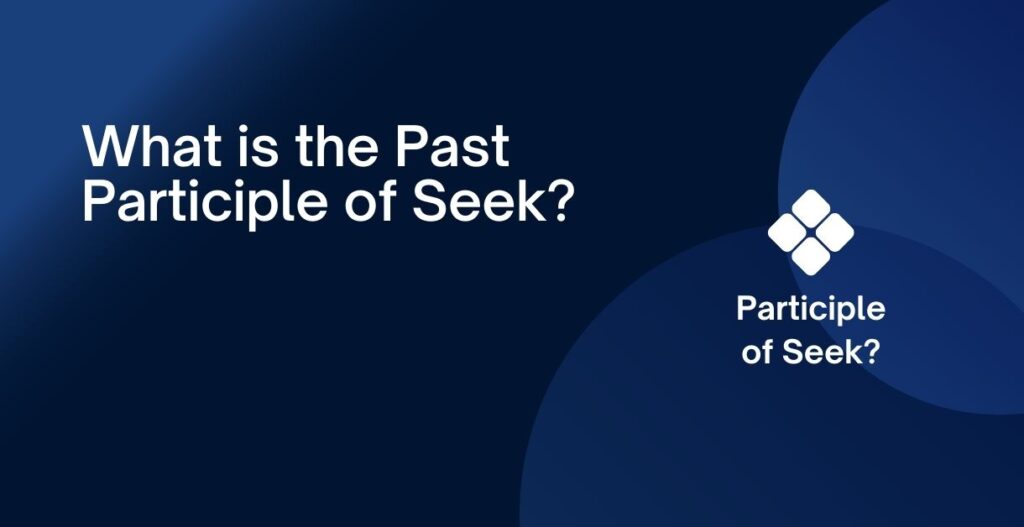The English language is full of quirks, especially when it comes to verb tenses. One common area of confusion is the past tense of the verb “seek.” If you’ve ever wondered whether to use “seeked” or “sought,” you’re not alone. Many English learners (and even native speakers) have questioned which form is correct.
What is the Past Tense of Seek?
In English, seek is an irregular verb, which means it doesn’t follow the standard pattern of simply adding -ed to the base form of the verb. So, the past tense of seek is “sought,” not “seeked.” This is one of those tricky spots where you need to remember that irregular verbs like seek don’t always behave like regular ones.
Let’s break it down:
- Present tense: I seek help when needed.
- Past tense: Yesterday, I sought advice from an expert.
- Past participle: I have sought many solutions to this problem.
Now that we know the correct form, let’s look at some sought examples in real-life contexts.
Sought vs Seeked: Which One is Correct?
You may have come across “seeked” in some informal or colloquial contexts, but it’s important to note that seeked is not the correct form. While “seeked” might appear in conversation or online writing, “sought” is the grammatically correct past tense and past participle form.
Seeked vs Sought: The Correct Usage
- Seeked: Incorrect in formal English.
- Sought: Correct in both past tense and past participle.
Here’s a quick recap: “sought” is the proper way to describe actions in the past when using the verb “seek.”
Verb Tense Confusion: Seeked or Sought?

Let’s go a bit deeper into why “seeked” might sound natural to some people. The problem lies in the irregularity of English verb forms. Many verbs, like “walk” (walked), “jump” (jumped), and “talk” (talked), follow a simple -ed pattern for their past tense. But for irregular verbs like “seek”, “buy,” or “go,” the past tense forms don’t follow this rule.
If you’ve mistakenly said “seeked” instead of “sought,” don’t worry—it happens. But now you know better!
Example Scenario
Let’s imagine a scenario where you’re sending an email to a colleague, asking for advice:
Subject: Seeking Your Expertise
Hi Jennifer,
I hope you’re doing well. I’ve been facing a bit of a challenge at work and wanted to know if you could share some of your expertise. I’ve sought advice from other team members, but I think your perspective would be incredibly valuable.
Could we set up a time to chat? I really appreciate your help!
Best regards,
Tom
Notice how “sought” is used in the past tense in this example. This is the correct form to describe that Tom has already asked for advice, in contrast to still seeking help in the present.
Seeked vs Sought in Everyday English
In most everyday conversations, sought will be the correct choice. However, many people, especially in informal settings, might mistakenly say “seeked.” For example, you may hear someone say:
- “I seeked out a solution to the problem.”
But grammatically speaking, this sentence should be:
- “I sought out a solution to the problem.”
Another Example in Email Form
Subject: Progress on the Project
Hi David,
I wanted to give you an update on the project. Over the past few weeks, I’ve sought feedback from several stakeholders. Based on their responses, I believe we’re on the right track.
I’ll follow up with more details after the meeting.
Best,
Rachel
Here, “sought” correctly reflects the past form of seek in a business context.
What is the Past Participle of Seek?

As we discussed earlier, the past participle of seek is also “sought.” It’s used in perfect tenses like present perfect or past perfect.
Here’s an example of the past perfect tense:
- By the time I arrived, they had sought all the necessary approvals.
In this case, the past perfect shows that the action of seeking was completed before another event (in this case, your arrival).
Seek Past Tense and Past Participle Usage
Now that we know “sought” is used for both the past tense and past participle, let’s look at a few more examples to reinforce the point:
- Seek Past Tense in a Sentence:
- Last week, we sought professional advice from a consultant.
- Past Perfect Tense with “Sought”:
- By the time the project started, we had already sought multiple opinions.
- Present Perfect with “Sought”:
- I have sought feedback from various sources to improve the design.
- Future Perfect Tense with “Sought”:
- By next year, we will have sought approval for all the initiatives.
Verb Conjugation: Seek vs Sought
Let’s take a look at the verb conjugation for “seek” to better understand how it fits into different tenses. This will help with verb tense confusion and ensure correct grammar usage.
| Tense | Verb Form |
|---|---|
| Present Tense | seek |
| Past Tense | sought |
| Present Participle | seeking |
| Past Participle | sought |
| Future Tense | will seek |
| Future Perfect Tense | will have sought |
Irregular Verb Examples
As we’ve established, “seek” is an irregular verb, meaning it doesn’t follow the standard -ed rule for past tense verbs. Here are some other common irregular past tense examples:
- Go → Went
- Buy → Bought
- Take → Took
- Write → Wrote
Understanding the Seek Past Perfect Tense
The past perfect tense is used to show that an action was completed before another action in the past. It’s formed using had + past participle (in this case, “had sought”).
Here’s an example:
- By the time Sarah called, I had sought advice from three experts on the matter.
Common Mistakes: Seeked vs Sought
Some common mistakes in English arise when learners try to apply regular verb patterns to irregular verbs like seek. Remember:
- Seeked is incorrect.
- Sought is correct.
It’s a simple rule to remember: Sought is always the past tense of seek!
Seek: Definition and Usage
Let’s quickly revisit the definition of seek before wrapping up. To seek means to attempt to find, search for, or try to obtain something.
For example:
- She seeks knowledge to improve her skills.
- He seeks to improve his writing through constant practice.
This verb is commonly used in everyday language and formal contexts alike.
Conclusion
In summary, the past tense of seek is “sought,” and it’s important to remember this when speaking or writing. Although you may hear people using seeked in casual speech, this is incorrect in standard English. Sought is the proper form and should be used in both past tense and past participle situations.
To avoid making mistakes with verb conjugation and correct grammar usage, it’s essential to understand the rules surrounding irregular verbs like seek. By practicing the correct forms, you’ll ensure you’re using English the right way. Whether you’re writing an email, a report, or simply engaging in conversation, you can now confidently choose between sought and seeked.
Keep these grammar tips in mind, and your English language structure will improve in no time!
Quick Recap:
- The past tense of seek is “sought”.
- Seeked is incorrect.
- Use “sought” in both the past tense and past participle forms.

“Smith is the dedicated admin of [grammarprotips.com], a platform focused on enhancing grammar skills. With a passion for language and education, Smith strives to make grammar accessible and enjoyable for learners of all levels. Committed to delivering high-quality content, Smith continually explores innovative ways to help users master the complexities of grammar.”

